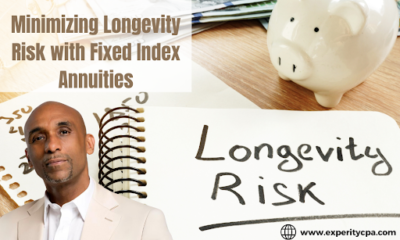Finance
5 Money Mistakes People Make After Retirement

Retirement, just like death, is as sure as the sunrise. You may delay it, postpone it, or even try to avoid it altogether. However, there’s no running away from the fact that you’ll retire from that job you’ve had for years.
Since retirement is something that comes sooner or later, the best you can do is prepare adequately for it. To start with, you should acquaint yourself with some of the common money mistakes that people make in their post-retirement years. This article highlights five of these mistakes and the ways to avoid them.
Letting Your Insurance Lapse
In most cases, retirement feels like a heavy yoke that has been lifted off your shoulders. You no longer have to wake up every day, braving the early-morning cold and traffic snarl-up to make it work in time. There are also fewer dependents, considering that you’ve successfully taken your kids through school and are now self-sufficient.
Based on these new changes, it may feel as though the burden of responsibility has somewhat lightened. As such, you may be tempted to cut back on your insurance. But before you do, note that most people who make insurance claims are those over fifty years.
While retirement may feel like it’s relieving you of some burdens, the reality is the other way around. Risks of physical injury, accidents, bankruptcy, diseases, and even death increase significantly in your post-retirement years. All of these necessitate an even stronger insurance policy from reputable companies like Colonial Penn Life.
According to numerous Colonial Penn reviews, the insurance company scores considerably high across various parameters, including the scope of risks and the suitability of processing insurance claims.
Not Knowing Your Entitlements
Entitlements are like rights; you’ve got to demand them yourself. Some of the common benefits you may be entitled to after retirement include;
- State Pension
- Pension Credit
- Employment and Support Allowance
- Jobseeker’s Allowance
- Disability Allowance
- Trade Union Allowance
Depending on the organization you were working with, you may also be entitled to concessions on travel. Most of these benefits become due almost immediately you retire. However, some may take a specific period before you can demand them. Whichever is the case, it’s essential to be aware of all your entitlements.
But the mere knowledge that you’re entitled to some retirement benefits isn’t enough. You should know the estimated sums to expect from each benefit to avoid getting the stick’s shorter end.
In an ideal world, you should receive all of your entitlements after the agreed period without any hassles. However, the convention is to proceed from the assumption that you may need a lawyer.
Not Managing Your Investments
Many people sacrifice a lot of their savings to undertake lucrative investments, only for their business ventures to collapse as soon as they retire. When this happens, you may lose money, but you could also suffer depression that you might never recover from.
Before retiring, it’s prudent to make all the necessary arrangements on how to manage your investments, even if only from the sidelines. That mostly includes hiring the most qualified and experienced managers to run your ventures.
You may not actively participate in the day-to-day operational procedures of your businesses. However, you shouldn’t lose touch with various crucial aspects, such as the company’s revenues and workforce. Keeping abreast of all the happenings within the company ensures that no critical decisions are made without your knowledge.
By default, you should be a board member of all the companies affiliated with you. If impossible, try to place your kids in influential positions within those companies.
Not Managing Your Debts
There are numerous ways to manage your debt after retirement. If you’re already in debt, work out the total sum of your debts. After establishing how much debt you owe, determine the most urgent ones and sort them out first. And while you’re at it, remember to pay your debts in time to avoid attracting additional penalties.
Another ideal practice is to always source for lenders that provide lower interests and impose lenient penalties on defaulters. Also, if you can, consolidate all your debts and pay them all at the end of every year. That will enable you to kick-start each year on a clean slate.
Most importantly, always control your appetite for debt by avoiding impulse buying. Before you purchase anything, subject it to the 30-day rule, where you typically allow yourself a grace period of thirty days to determine whether you’re still interested in the item.
Spending Money like there’s No Tomorrow
After living a rather fast-paced life for the rest of your working years, retirement may feel like an excellent opportunity to catch up on what you’ve missed all those years. For most people, the remaining few years of their life should be dedicated to traveling, shopping, meeting new people, and pursuing all manner of pleasurable activities.
Those are all legitimate ways of living your life after retirement. Like everyone else, you deserve the finest things in life. Unfortunately, many of those activities require vast sums of money. Don’t go splashing on the trendiest automobile or the latest tech gadget in town, as you may plunge into debt faster than you could ever have imagined.
The best solution out of this is to plan your expenditure by listing all the places you wish to travel to and things you intend on buying. You can then start by spending on the least expensive or most urgent items on the list. If it comes down to it, hire a financial advisor.
Remember, retirement isn’t the end of life. Instead, it’s the beginning of a whole new chapter that calls for more prudence in how you spend your money. As you age gracefully, you should also ensure that you don’t lose touch with your sense of money, especially your savings and investment.
-

 Gadgets & Electronics7 days ago
Gadgets & Electronics7 days agoComprehensive Acer Chromebook Laptop Reviews: Unveiling the Best Models of 2025
-

 Cryptocurrency7 days ago
Cryptocurrency7 days agoBlockchain Beyond Cryptocurrency: 5 Game-Changing Applications You Should Know
-

 Government7 days ago
Government7 days agoTrump Administration Targets Harvard: Federal Contracts and International Students at Risk
-

 Education7 days ago
Education7 days agoUnlocking Knowledge: How the Udemy App Transforms Online Learning
-

 Art & Culture7 days ago
Art & Culture7 days agoThe Ultimate Guide to Nails Hollywood: Trends, Styles, and Top Salons in 2025
-

 Art & Culture7 days ago
Art & Culture7 days agoDiscover the Best Romance Movies on Netflix: Your Ultimate Guide for 2025
-

 Art & Culture7 days ago
Art & Culture7 days agoExploring the Minimalists Books: A Journey to Simplicity and Purpose
-

 Business7 days ago
Business7 days agoIs the Housing Market Going to Crash in 2025? Insights and Predictions Ahead






























